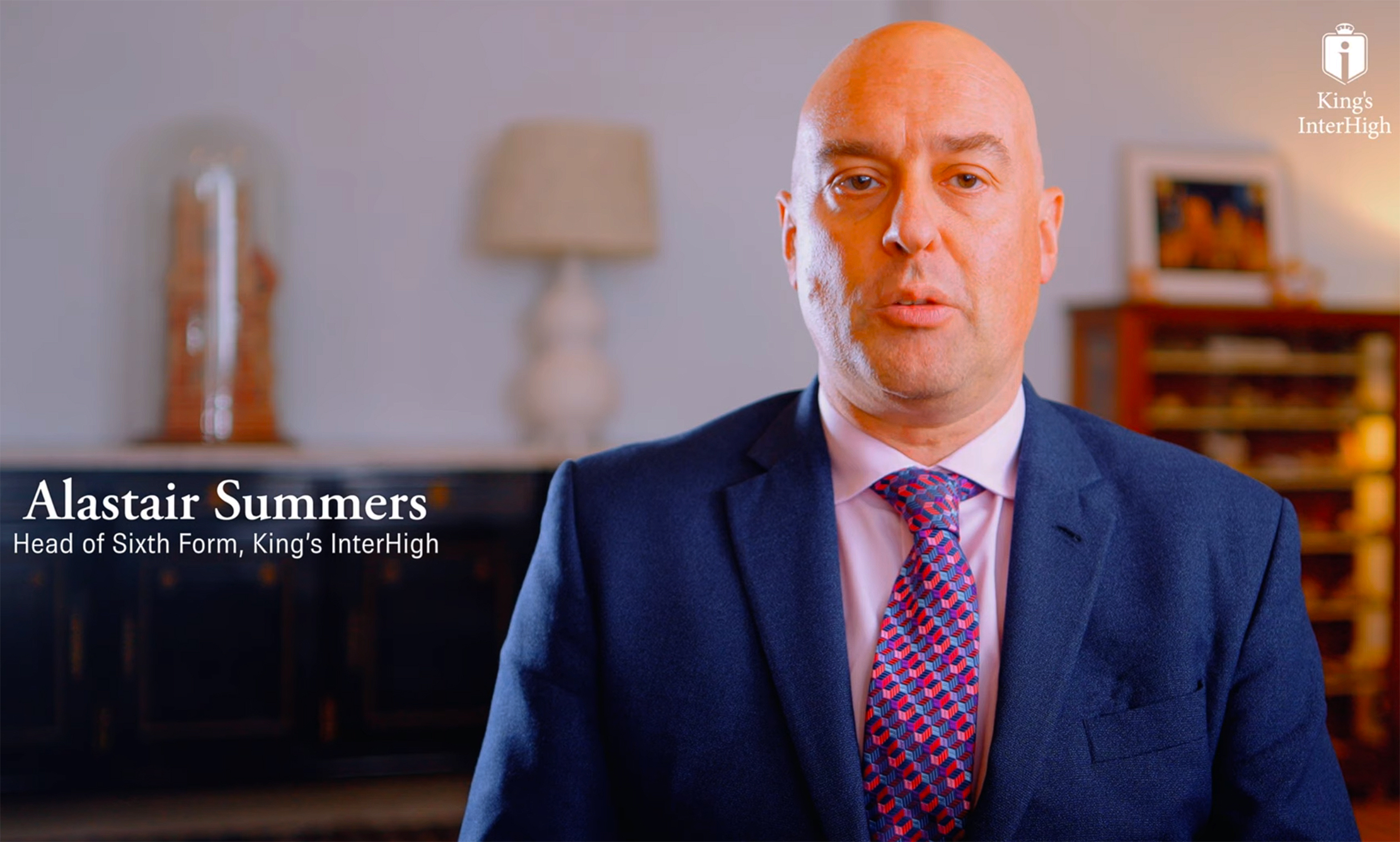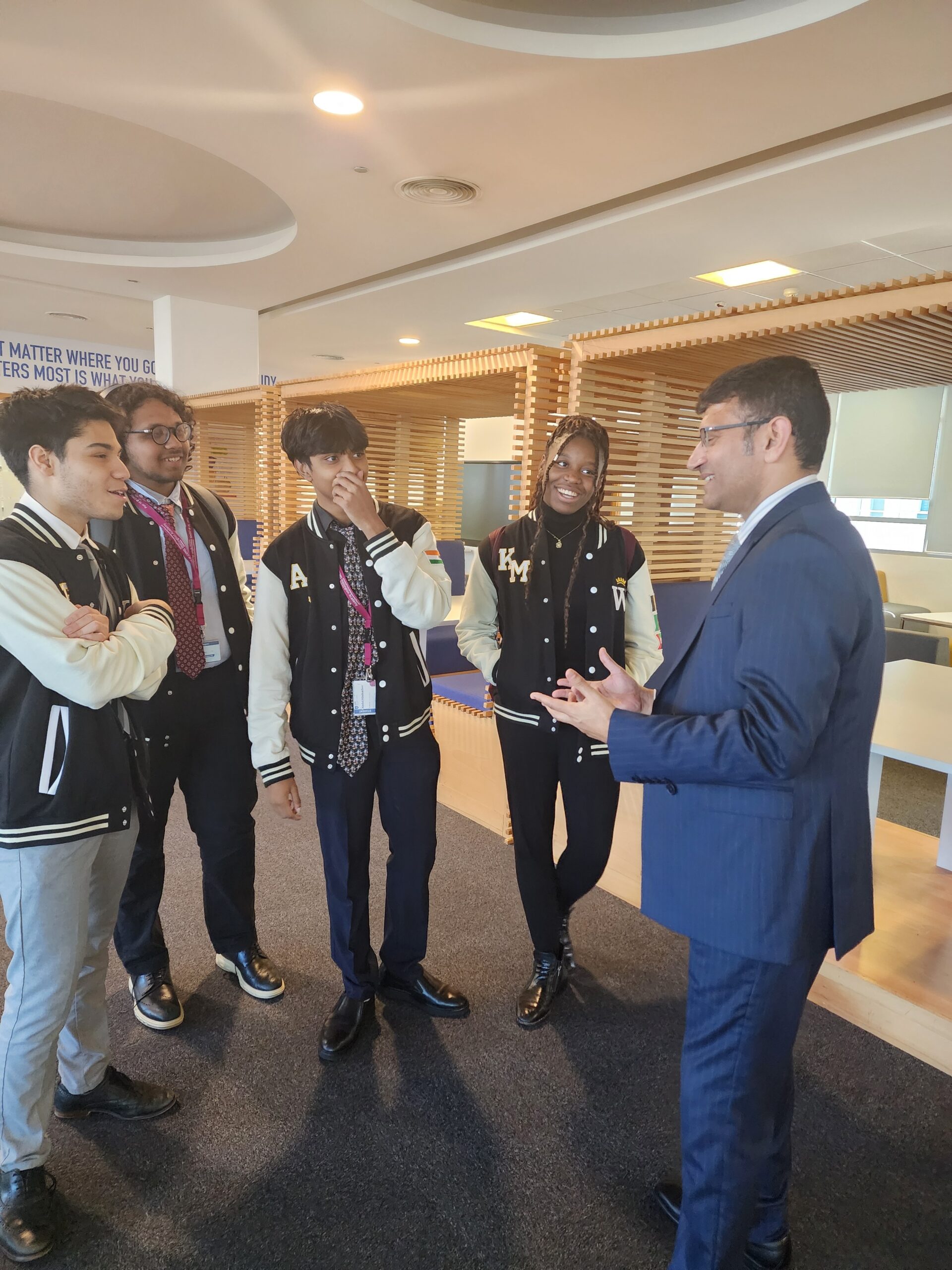The International Baccalaureate (IB) is the fastest growing curriculum in the world, with the number of IB programmes offered worldwide skyrocketing by more than a third between 2018 and 2022. In Dubai almost 26,000 students currently study the IB across 17 IB-curriculum schools – a number that has also steadily risen over the past five years.
Although the IB Diploma Programme (IBDP) has existed as a Post-16 qualification for more than half a century, it still remains relatively enigmatic to some parents, many of whom are more comfortable with their child studying a curriculum that is more familiar to them. But as the IBDP rises in prestige and popularity, increasing numbers of parents are wondering: should my child switch to the IB? Are they capable of doing the IBDP? And when is the right time to make the switch?
We spoke to educationalists and students in the UAE to discover more about the IBDP and what it’s like to switch to the IB from other curricula…
Why is the IB growing in popularity?

The IB Diploma has shown a steady increase in popularity globally over a number of years and is particularly relevant in a diverse expat environment made up of many cultures likes the UAE, says Alastair Summers, Head of Sixth Form at Kings InterHigh (pictured above):
“The IBDP is highly regarded by top universities across the world and recognised as a rigorous but well-balanced programme which delivers students with the skills needed to thrive in tertiary education and beyond.
“One of the great advantages of the IB diploma is that it is relatively immune to the political interventions which take place in the education systems of individual countries. “Many students choose to do the IB diploma both to keep their options open in terms of subjects they can study at university because it is a broad course, but also because they want to take advantages of the opportunities that are available to them across the world.”

Ian Thurston, School Principal, Dubai International Academy Al Barsha (pictured above) agrees, adding that the well-rounded nature of the IBDP is also attractive to students in the modern world:
“The IB is growing quickly in the UAE, largely because of its holistic approach to education, which is well suited to the rapidly changing world we live in today. Many parents and educators are drawn to the IB’s broad and rigorous curriculum, but the IB goes beyond academics, with an emphasis on personal skills, social responsibility, critical thinking, links to real-world issues and international-mindedness, developing well-rounded individuals prepared for today’s globalised world.”

Pictured, inset right, Hitesh Bhagat, Principal, Dubai International Academy Emirates Hills, holding the Top Schools Award for Best International Baccalaureate School in the United Arab Emirates achieved by his school in 2024 with Michelle Puxty – Head of Secondary School, Dubai International Academy Emirates Hills, to his left, and, inset left, Tom Collar – Head of Primary School, Dubai International Academy Emirates Hills
The IB’s focus on real-world skills, such as debating, negotiating and presenting in public, also make it desirable for UAE families, says Hitesh Bhagat, School Principal, Dubai International Academy Emirates Hills:
“The IB classroom is popular as it features discussion and two-way communication between teacher and students. Every member of the class is encouraged to speak up and voice their opinions. This style of teaching produces students capable of original thought, who are confident in their perspectives and willing to listen and be informed by others.”

Pictured: Timothy Roberts, Principal, Raffles World Academy Dubai
The IB has also gained interest because of its resilience to grade inflation, which had a negative impact on the value of A-Level grades over the pandemic, argues Timothy Roberts, School Principal, Raffles World Academy:
“As recognition from universities increases and the successes of former IB students are becoming more widespread, so too does the uptake in schools increase. In addition, unlike some post 16 education offering, the IB has been steadfast in maintaining standards, there has been no grade inflation. Grade inflation has eroded the gold standard of the A levels. The language component is also a valuable selling point in a globally connected world.”
The IBDP has become so popular that Kings InterHigh – a UK-headquartered online schools that operates flexible live timetables in the UAE and Gulf – recently piloted the first official IBDP online. Mr Summers says :
“Since the introduction of the online pilot last year at KIH the IB diploma course has proven very popular.
“We currently have nearly 150 students following the programme across year 12 and year 13 with growth of over 50% seen in the year 2 cohort.
“Admissions for our third cohort are already underway and the level of interest in the course is considerable so we are forecasting further growth.”
How is the IBDP viewed by universities around the world compared to other academic pathways?
There is now some compelling research suggesting that IBDP students excel at university compared to their peers in other academic pathways – something that university admissions offices appreciate, says Alastair Summers, Head of Sixth Form at Kings InterHigh:
“Generally, the IB is viewed very positively by universities around the world, and it benefits from very high levels of recognition. In the US and Canada for example the diploma is viewed by many institutions as the best preparation for university and is considered favourably compared to national qualifications. In the UK the IB is also very well regarded.
“You won’t get institutions saying publicly that they prefer it over A levels, but the surveys completed by admissions officers consistently recognise how well IB students are prepared for university life compared to their peers.
“Also, the statistics suggest that IB students are more likely to complete their university courses, more likely to get a first-class honours and more likely to continue to pursue higher level qualifications.
“Students holding the diploma qualification are able to successfully access institutions right across the globe, and we notice that our IB students are more likely to apply to multiple countries.”
Timothy Roberts, School Principal, Raffles World Academy agrees, adding that university applications from IB students may even be favoured over those with A-Levels, which has traditionally been viewed as the gold-standard qualification:
“IB university offers are generally favourable compared to the A levels. The universities value the skills the students present with. Various studies have shown that the attrition rate in the first year of university studies is less than when compared to the A level system for example.”
It’s common for IB students to be offered incentives to attend certain universities, says Ian Thurston, School Principal, Dubai International Academy Al Barsha:
“Universities recognise the variety of skills IB students arrive with and often seek to admit IB students, offering scholarship incentives over and above other curricula.”
Is it risky to switch to the IBDP from other curricula?
The IBDP is well-known for being rigorous, and parents are often concerned that their child might struggle with the breadth of subjects and perform less well in the IBDP than in a different qualification pathway. However, schools are aware of the differences in styles between the IBDP and other curricula, and many have support in place to facilitate a students transition between curricula:
Sheldon Dias, Educational Supervisor and IBDP English Facilitator, GEMS Modern Academy says:
“Transitioning between academic boards is always laced with uncertainty. The requirements, processes, standards, and practices of the International Baccalaureate are distinctive from other curricula.”
For this reason, GEMS Modern Academy provides a ‘bridge programme’ for its students, which Dias says provides an invaluable scaffold for students transitioning from the ICSE to the IBDP:
“The programme’s overarching design is notably experiential and hands-on, and ensures students are holistically prepared, not merely from an academic standpoint, but also equipped with the requisite skillset aligned with the IB’s dynamic pedagogical framework.”

Pictured: Joel Nainie, IB Director of Programmes, GEMS Wellington Academy – Silicon Oasis, discussing the power of the IB with GEMS Education students
This also happens at GEMS Wellington Academy – Silicon Oasis, says Joel Nainie, IB Director of Programmes, GEMS Wellington Academy – Silicon Oasis (WSO):
“Students at WSO who embark on the International Baccalaureate Diploma Programme (IBDP) after completing their GCSEs have access to a range of robust support systems to aid their academic and personal growth. These include early intervention programmes for student underachievement, additional revision classes, out-of-class personalised support from subject teachers, support from the Special Educational Needs team, support from the careers advisor, as well as support from the counselling team as per the specific needs of students. Collectively, the academic and pastoral needs of students are addressed to improve the lived experience of students who transition to WSO Post -16.
“Ultimately, the support available to students transitioning from GCSEs to the IBDP serves to bridge the academic leap, enhance personal development, and cohere a sense of many pathways within a single Post-16 community. This multifaceted assistance equips students with the tools needed to excel in the challenging yet rewarding journey of the IBDP.”
The majority of IBDP students have switched from different curricula when they join the Kings InterHigh online IBDP, says Mr Summers, although some have been through schools which run the Primary Years Programme (PYP) and Middle Years Programme (MYP). While there are certain challenges, they are overcome relatively easily, he explains:
“A big change that a lot of students notice when coming from their national system to the IB diploma is the level of discussion and collaboration between students and between students and teachers. Often students have been very used to being passive recipients of information from a teacher who delivers from the front. It is a new experience drawing on the collective knowledge in the room and then doing active research. However, once they have settled recognise just how effective this is as a way of learning.”
Is the IBDP just “too hard” for some students?
Unlike the UK’s A-level – where a student must specialise in three or four subjects – IB students are required to study courses from six different subject groups, including Languages, Individuals & Societies, Sciences, and Mathematics. It also requires students to do a research paper through the Extended Essay and develop the skills of free dialogue through Theory of Knowledge (TOK). Does this mean your child could find it too challenging?
It’s important to keep in mind your own child’s interests and aspirations, says Ian Thurston, Principal of Dubai International Academy Al Barsha:
“Let’s be honest; no one curriculum is correct for every child, so it is important to find which suits your child’s interests and talents.
“The IBDP is probably the most challenging, but this should be seen as a positive; who has ever achieved anything great by taking the easy way out?
“But remember, the IB DP is only one pathway of many for students; we offer IB Courses, which is a tailored programme to suit individual interests and capabilities, and the IB Career-Related Programme which is a blend of academic and vocational learning, centred around one area of interest, such as Business. This these 3 pathways, post-16, we believe we have a route to success for all our students.
“The important things to consider are: where will it take me? What skills will I have developed by the time I get there? Does it interest me and suit my learning approach?”
Hitesh Bhagat, School Principal, Dubai International Academy Emirates Hills agrees that parents should always consider a student’s individual strengths, as well consider different pathways within the IB:
“Every child has their unique requirements. IBDP is rigorous and demanding but with good self-management the child is able to come out with flying colours. In case of not fitting well, there are other pathways available within the IB system. Students can move to IB Courses or IB Career-related Programme. These alternative pathways allow the child to work at a slower pace but still compete against the same universities.”
The IBDP might not be for every child, but there are ways of facilitating it for many, says Mr Roberts:
“On occasion the language component can be a challenge for students. However the ab initio courses(beginner) can alleviate this. In addition the IB offers course pathways at two different levels, and an additional pathway, the CP. With a dedicated academic team the right path can be found for almost every child.”
What’s your advice to a parent whose child is considering switching to the IBDP curriculum?
Making a change is a big decision, so it needs to be well thought out, says Mr Thurston:
“Consider your academic profile: are you equally talented across a wide range of subjects, or do you have particular skills in a couple of areas? The IBDP is broad and whilst you’re not expected to get top marks in all subjects, it does help if you are broadly academic.
“The IB will also require a lot of independent thinking, so if you are a student who likes being given some autonomy over the topics that you investigate, then it may be a good fit.
“Schools will know what sort of academic profile suits the IBDP; for some students, it may be that they simply need to choose their subjects carefully, or their Higher Level subjects specifically.
“For others, it may be that IB Courses or IB CP suit them better. It should be an open and honest dialogue between parents and the school; remember, we all want the same thing – your child to be successful.”
If your child is academically curious, the IBDP could be for them, regardless of the previous academic background, says Mr Summers:
“As a general rule I would encourage most students to consider the IB diploma whatever system they have been through as it really is an excellent education, and it keeps so many doors open.
“Students with a level of intellectual curiosity and those who are interested in the world beyond their immediate borders are most likely to thrive.
“A minority of students are very focused on a narrow range of subject interests, and may not find the breadth of curriculum in the IB Diploma to their taste.
“Also the IB rewards those who are able to work continuously and independently as there are coursework elements that count towards the finals in all subjects, so those students who have a tendency to cruise and then cram can get into difficulties if they are not careful.”
But Mr Bhagat recommends the IBDP to almost anyone:
“Make the switch – it will be rewarding and an amazing experience. Being exposed to multiple perspectives, learning to articulate your own opinions, balancing academic work with co-curricular activities, learning through experience, researching and managing your own work – the level of personal growth that IB students achieve is reason enough for choosing this program.
“The initial struggle will be to develop independent study skills. The key to good independent study is time management and this skill is picked up instinctively by IB students. Establishing good study habits, setting aside time for assignments, developing individual revision techniques and resisting distractions – students who master these skills will be one step ahead when they progress to university level education.”
What is it like to switch to the IBDP from the UK system?
Zaina Al Laham, a Year 12 IBDP student at GEMS Wellington International School told SchoolsCompared.com:
“The main reason I decided to switch to the IBDP was because I believe that it offers global acceptance from a university perspective, in a way that other programmes do not. It allows me a greater sense of opportunity when it comes to universities, in a greater range of countries, with fewer stipulations for the requirements for entry because universities know the programme already and the benefits it can bring. I also believe that the rigour that the programme has is more likely to prepare me better for university entry – and that matters a great deal to me.”
Ujjwal Agarwal, a Year 13 IBDP student at GEMS Wellington International School continued:
“The workload is more intensive on the DP, with more of my time taken up by lessons and teaching, rather than study periods, and so I get to see more of my teachers, more regularly. I collaborate more with my peers on the DP to foster my understanding, and the independence the programme provides allows me to manage my own workload and deadlines better and enables me to plan accordingly. I found that GCSEs place the workload more towards Year 11, but the DP structure means that you spread the workload over the two years, allowing you to manage your time more effectively.
“I think that subjects go into more depth in the IB and you’re more independent in your ability to learn. Success at GCSE really does prepare you well for IB study and it’s a different curriculum, so it fosters independence and personal growth.”
What’s it like to switch from the Indian system to the IBDP?
SchoolsCompared.com spoke with Krish Kapoor, DP student at GEMS Modern Academy.
Why did you decide to switch to the IB?
“Switching from the ICSE Indian curriculum to the IB was like stepping into a whole new world of educational possibilities. With the ICSE curriculum, I felt there wasn’t enough room to pursue my passions in extracurricular activities.
“The IB isn’t for the faint of heart, but it offers something priceless – a balanced approach to learning. Sure, it’s academically intensive, but it’s not only about memorising facts and figures. It’s about nurturing independent thinkers and encouraging students to question the world around them. The crown jewel of this approach is the Extended Essay, a chance to dive deep into a subject of personal interest, cultivating research and analytical skills that will last a lifetime.
“But what really sealed the deal for me was the Creativity, Activity, Service (CAS) component. It’s not just a box-ticking exercise; it’s a structured invitation to explore the uncharted territories of creativity and service to the community. It’s an opportunity to become a well-rounded individual, someone who excels not just in the classroom, but also in leadership, interpersonal skills, and creative thinking.”
What’s it been like moving to the DP?
“Moving to the IB Diploma Programme has been nothing short of a transformative journey, marked by its challenges and rewards. Completing my first year in the IB was undoubtedly tough, especially when the final term hit with a barrage of exams and Internal Assessments (IAs).
“I chose a challenging combination of Higher Levels (HLs), including Maths AA, CS, and Physics. Initially, these subjects seemed like daunting mountains to conquer, but slowly I began to decipher the unique IB approach to these disciplines. The IB doesn’t just encourage memorisation; it demands a deeper understanding, critical thinking, and application of knowledge.
“Then there was Theory of Knowledge (TOK), a subject many of us struggled with initially. It introduced us to a whole new way of thinking, diving deep into questions like ‘Why is a fan called a fan?’ The epistemological approach was initially bewildering, but I learned that understanding TOK takes time and patience. It’s about nurturing a different mindset, and eventually, it started making sense.
“One thing that kept me going through the challenges was the unwavering support from our school. They organised various events and activities related to the IB programme. We celebrated language festivals, EE showcases, and enjoyed CAS soirees, where we could showcase our creative and service-oriented endeavours.
“If I were to offer advice to future IB students, I would say this: The first year is bound to be tough. You might score low on your initial tests, but don’t stress. Your coordinators and teachers are your pillars of support. They’re there to guide you, help you grow, and eventually excel. Remember, the IB programme isn’t just about acing exams; it’s about developing into a well-rounded, critically thinking individual. So, embrace the challenges, stay determined, and trust the process. The rewards will be worth it in the end.”
Have you noticed any marked differences in the two curricula?
“Stepping into the IB programme from the ICSE curriculum has been quite a journey for me. First off, IB is known to be more challenging. It’s like shifting from a sprint to a marathon. It’s tougher, no doubt, but the rewards are bigger, too.
“In terms of exams, IB takes a different approach. They ask fewer questions, but those questions are like big puzzles with lots of pieces. They make you think deeply, not just spit out facts. ICSE, on the other hand, has more questions, but they can be tricky in their own way.
“English in IB is a whole new level. It’s not just about understanding texts; it’s about looking at them closely and thinking hard.
“Internal Assessments (IAs) in IB are like the projects in ICSE but with a scientific twist. You become a bit of a scientist, doing experiments, and collecting real data. They take a lot of time and precision.
“CAS in IB is like an upgraded version of SUPW from ICSE. It’s about doing more activities and projects that help you grow personally. It’s about being creative, getting active, and doing meaningful things for others. So, in simple words, IB is harder and requires much more work, but it’s also a chance to learn and grow in exciting new ways. It’s like stepping into a bigger world of learning, and I’m looking forward to the rest of the journey.”
Further information
Read our review of King’s InterHigh here.
Visit the official King’s Interhigh Web site here.
Read our review of Dubai International Academy Al Barsha here.
Learn more about the IB at the official Dubai International Academy Al Barsha school web site here.

Read about the award winning Dubai International Academy Emirates Hills here.
Read our review of Dubai International Academy Emirates Hills here.
Visit the official Dubai International Academy Emirates Hills web site here.
Read our review of Raffles World Academy here.
Visit the official Raffles World Academy web site here.
Read our review of GEMS Wellington Academy – Silicon Oasis here.
Visit the official GEMS Wellington Academy web site here.
Read our review of GEMS Modern Academy here.
Visit the official GEMS Modern Academy web site here.
Read our review of GEMS Wellington International School here
Visit the official GEMS Wellington International School web site here.
© SchoolsCompared.com 2024-2025. All right reserved.
































































Leave a Response